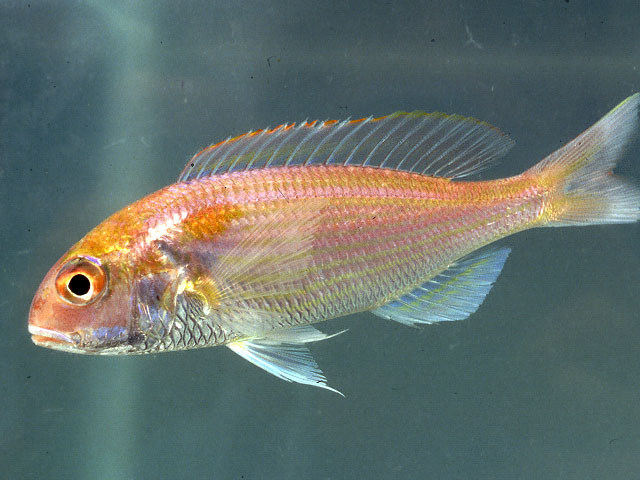
|
Nemipterus japonicus (Bloch, 1791) Japanese threadfin bream |
||
Japanese threadfin bream Lawihan, Bakag, Bakag, Bidugo, Bisugo, Bisugo, Bisugo, Bisugo, Bisugo, Bisugo, Bisugong bututan, Bisugong selay-selay, Bitsugo, Hutik, Kanasi, Kulisi, Lagao, Lagao, Lagao, Lagaw, Lagaw, Lawian, Lawihan, Saging-saging, Sagisi, Sagisi-on, Sagision, Salmonete, Silay, |
||

|
|
photo by
Cook, D.C. |
| Family: | Nemipteridae (Threadfin breams, Whiptail breams) | |||
| Max. size: | 32 cm TL (male/unsexed); max.weight: 596.0 g; max. reported age: 8 years | |||
| Environment: | demersal; depth range 5 - 80 m, non-migratory | |||
| Distribution: | Indo-Pacific. A Red Sea immigrant into the Mediterranean reported from Haifa Bay (2005) (Ref. 72453, 72484). A record of this species from northwestern Australia is unfounded. | |||
| Diagnosis: | Dorsal spines (total): 10-10; Dorsal soft rays (total): 9-9; Anal spines: 3-3; Anal soft rays: 7-7. Eleven to twelve pale golden-yellow stripes along body from behind head to base of caudal fin. A prominent red-suffused yellow blotch below origin of lateral line. Pectoral fins very long, reaching to or just beyond level of origin of anal fin. Caudal fin moderately forked, upper lobe slightly longer than lower and produced into a short or moderately long filament. Three transverse scale rows on preopercle. Axillary scale present. Color: Upper body pinkish, silvery below. | |||
| Biology: | Very abundant in coastal waters, found on mud or sand bottoms, usually in schools. Feeds mainly on small fishes, crustaceans, mollusks (mainly cephalopods), polychaetes and echinoderms. Marketed mainly fresh, but also frozen, steamed, dried-salted, dry-smoked, fermented or made into fish balls and fish meal. | |||
| IUCN Red List Status: | Not Evaluated (Ref. 96402) | |||
| Threat to humans: | harmless | |||
| Country info: | Also Ref. 998, 12753. | |||
| Entered by: Carpenter, Kent E. - 15.06.92 |
| Modified by: Garilao, Cristina V. - 15.07.99 |
| Checked by: Russell, Barry - 04.10.95 |